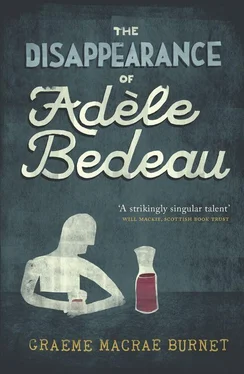There were three other customers in the bar. A man in a shabby suit sat on the banquette beneath the high windows reading a newspaper, a glass of white wine on the table in front of him. He looked vaguely familiar. This was a common occurrence for Gorski. His work brought him into fleeting contact with a great number of people and in a small town like Saint-Louis it was inevitable that he ran into them again. His predecessor, Ribéry, had been blessed with total recall of the names and faces of people he met, but Gorski possessed no such a talent. Still, it bothered him that he could not remember who the man was.
Two men in workmen’s overalls stood at the bar. One of them looked at Gorski as he settled himself at his table. He probably recognised him. The previous day he had held a press conference at which he had given out the description of the young man seen on the scooter with Adèle. Gorski had been at pains to stress that the young man was sought only as a witness, but the papers had naturally chosen to cast the development in the most lurid light. Gorski’s picture had appeared next to the story in L’Alsace and in several other papers. He nodded a greeting in the direction of the man at the bar, who immediately looked away.
The proprietor brought his beer. He was a short, swarthy man with the build of an ex-boxer. He had small beady eyes and a slack, unattractive mouth. Gorski had overheard regulars address him as Yves, but he never greeted him by name. Similarly, although he must have recognised him, the proprietor did not show any sign of knowing Gorski. That was his way. Some bars fostered an atmosphere of conviviality. Le Pot was not one of them. If you made a remark to the proprietor, he would pass the time of day, but otherwise customers were left to themselves.
As Yves set his beer in front of him, Gorski asked him for a hotdog. Before he made his way back to the bar, he made a tour of the tables, wiping each of them down in the same unhurried manner. Gorski sipped his beer. It was pleasingly cold and crisp. His hotdog arrived on a paper plate. The meat was pink and flabby and disintegrated unpleasantly as soon as he put it in his mouth. He thought of Manfred Baumann tucking into his pot-au-feu or whatever it was he had been eating.
His talk with Baumann had gone pretty much as he had anticipated. If he was lying, he was hardly likely to admit to the fact unless confronted with irrefutable evidence to the contrary. Gorski was used to being lied to. People lied as matter of course and even when their lies were shown to be implausible, they were stubborn. Gorski understood the mechanism well. If, for example, his wife was to later ask him how he had spent his afternoon, he would, of course, omit any mention of his visit to this bar. What interested him was not so much the fact that someone lied, but how they behaved when they did so. Often people would reach for their cigarettes or became suddenly distracted by some irrelevant activity. They became incapable of maintaining eye contact. Women toyed with their hair. Men fingered their beards or moustaches. Gorski liked to question people in their everyday surroundings. Once a person had been dragged to the police station they were already disoriented and it became harder to discern whether their behaviour should be attributed to their unfamiliar surroundings or to the fact that they were trying to hide something. Gorski recalled that when he had visited Baumann at his apartment, he had, despite being initially reluctant to invite him inside, offered him coffee. It was a typical gesture — at once overcompensating for his previous hostility and attempting to postpone the start of the interview. Even at that point, when he had no way of knowing what Gorski’s visit was about, Baumann had behaved in a way that suggested he was uncomfortable.
Often, when confronted with their lies, people feigned indignation. How many times Gorski had heard the phrases This is outrageous! and How dare you! or been idly threatened with legal action. He took such outbursts, if not as a sign of guilt, at least as an indication that the person in question had something to hide. Something perhaps completely unrelated to the object of his enquiry, but something nonetheless. Manfred Baumann had not done this. He was, Gorski suspected, too meek an individual for such a course of action. Neither had his demeanour betrayed much of his inner thoughts. He struck Gorski as the type who, for whatever reason, was accustomed to keeping a lid on things. He was repressed.
On the other hand, the possibility that Baumann had not seen anything could not be entirely dismissed. People were unobservant, especially when going about their daily routines. They walked or drove to and from work, sat in the same offices and cafés every day without giving the least thought to their surroundings. Often, when questioned, people were unable to describe the furniture or decor of places they visited regularly. Still, Manfred Baumann intrigued him. Whether he was lying or not, there was something in his manner that piqued Gorski’s curiosity. He was at once evasive and obsequious, as if he wanted to be liked or at least approved of.
Nevertheless, it was a measure of how poorly the case was progressing that Gorski was spending so much time thinking about Baumann, who had, in all likelihood, nothing whatsoever to do with the girl’s disappearance. The case was of the worst sort. It was not even clear whether a crime had been committed. Yet the disappearance of a young woman always garnered press attention and the police were obliged to investigate, or at least be seen to investigate. Had it been a middle-aged man who had disappeared, someone like Manfred Baumann, for example, the case would not even make the ‘In Brief’ section of L’Alsace.
Thus far, Gorski had been unable to form more than a rudimentary picture of the young woman whose disappearance he was investigating. Adèle Bedeau’s mother had died some years before and her birth certificate recorded no father’s name. Mme Pasteur was fond of her and plainly harboured maternal feelings towards the girl, but Adèle had revealed little to her employer. She was a good worker, punctual and polite, but little more. It did not seem to matter to her whether she was scrubbing the kitchen floor, chopping onions or waiting tables. She carried out whatever task she was allotted with the same world-weary air. Marie Pasteur described her as diligent. It seemed to Gorski that she was resigned. She simply didn’t care what she did. Her relations with her employers and the patrons of the Restaurant de la Cloche were cordial enough, but she did not ask questions, talk about herself or joke around with the other employees. She was entirely self-contained. And outside work, Gorski had discovered little more. The tiny furnished apartment she rented in a building on Rue de Jura could barely have revealed less. She paid her rent on time and her neighbours had little to say about her.
Gorski had gone through her rooms feeling, as he always did on such occasions, like an intruder. The apartment consisted of a single bed-sitting room with an adjoining kitchenette and a tiny shower room. It was early on Saturday afternoon when Gorski had gained access. There was no concierge in the building and the landlady, whose name he had forgotten, leaned on the door jamb, her arms folded under her large bosom, a bored expression on her face. She was a squat woman with dyed hair and thick plastic-framed glasses. The venetian blind was lowered and Gorski had the impression that it was seldom raised. The air was stale. Gorski felt uncomfortable under the landlady’s gaze. He disliked being scrutinised going about his work, especially so when it involved going through the personal effects of a young female.
Читать дальше












